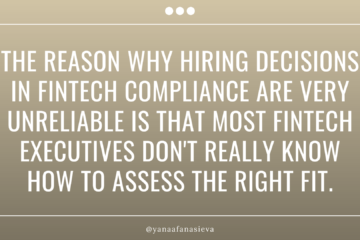Where to Find Board Members and How to Pay Them?
FinTech startups often struggle to find the right Board Members, and indeed there is a lot of confusion about who they should be, how much you can expect from them, and what their fees should be.
Let me break it down for you. (And by the way, if you prefer to listen to this information instead of reading, you can do it by tuning into this podcast episode of Compliance That Makes Sense. 🎙️
Who needs a Board of Directors and what is the difference between the Management (or Executive) Board and the Supervisory Board:
- Management or Executive Board consists of managers or executives who work for the company. Every company needs some form of an executive body or authorized managers who are able to sign documents or enter into contracts or make commitments on behalf of the company. The commercial code in your country determines how many directors are needed for each legal entity form and this requirement is reflected in your Articles of Association.
- Supervisory (or Independent) Board of Directors is usually required by law when an entity is a financial institution, is applying for a financial license, or collecting and using public funds (e.g. charities or foundations). It is also very common to establish an independent board when investors give you funding or grants: either a representative of your investor will have the right to nominate a board member or they will require you to establish a supervisory board. The independent directors (sometimes they are called “NED” or non-executive directors) do not work for the company but they do have expertise in your industry, connections, and knowledge of a specific field, and their role is to advise the management, review and approve the strategy, plans, and results, and ensure prudent governance.
The Supervisory Board does not need to consist of 100% of independent directors, it is usually sufficient that the majority of the directors are NED or independent. The most common case is a Supervisory Board consisting of 3 individuals: a company executive, and two independent members.
Let’s assume, it’s clear to you that you need to form an independent Board. Where do you start? 🤔
- Ask your investors and mentors – they know your business, they want you to be successful, and they have the experience;
- Ask successful businessmen in your field, retired executives;
- Ask your ex-bosses or other senior corporate executives, especially from companies you are dying to work with;
- Ask lawyers and Big4 partners (but be careful and clearly define your expectations);
- Do not ask your friends and ex-buddies because you think it might be “convenient” and they would sign anything they need to sign and won’t make any trouble;
- Do not ask people who won’t be available because you will need your board members to be available and make decisions and work efficiently together;
- Do not ask people who are just there for the money.
How much should I pay them? 💰
- If your investors appoint a board member as a condition to give you funding, it’s often free.
- The basic directorship fee can start from 25,000 EUR per year for a small management company or a fund and be at 100,000+ EUR per year, for a larger financial institution, or where directors have a lot of personal liabilities.
- It is a good idea to have D&O insurance (“Director and Officer” insurance) and it can cost a small startup around 10-20K EUR a year (for all directors and officers), depending on the insured amount.
- You can offer your directors a small equity plan (0,1%-0,5%), and then their compensation could be lower.
Do you see now how it starts making sense for you, right?


